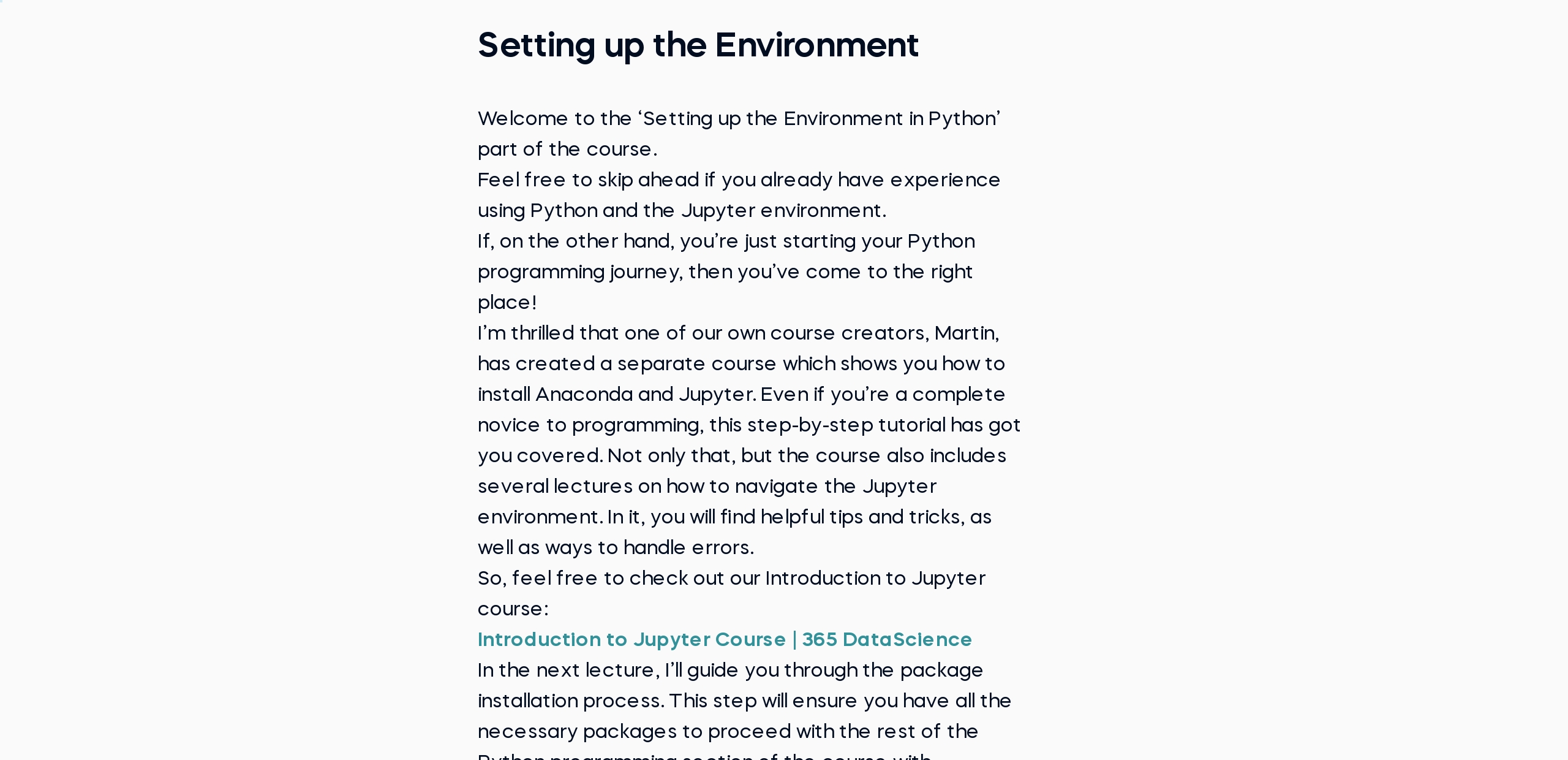Machine Learning in Python
Master advanced statistical techniques and predictive modeling with Python. Acquire the essential skills for aspiring data scientists.
 Start for Free
Start for Free
What you get:
- 7 hours of content
- 92 Interactive exercises
- 12 Coding exercises
- 133 Downloadable resources
- World-class instructor
- Closed captions
- Q&A support
- Future course updates
- Course exam
- Certificate of achievement
Machine Learning in Python
 Start for Free
Start for Free
What you get:
- 7 hours of content
- 92 Interactive exercises
- 12 Coding exercises
- 133 Downloadable resources
- World-class instructor
- Closed captions
- Q&A support
- Future course updates
- Course exam
- Certificate of achievement
$99.00
Lifetime access
 Start for Free
Start for Free
What you get:
- 7 hours of content
- 92 Interactive exercises
- 12 Coding exercises
- 133 Downloadable resources
- World-class instructor
- Closed captions
- Q&A support
- Future course updates
- Course exam
- Certificate of achievement
What You Learn
- Master foundational machine learning techniques that will take your data analysis skills to the next level
- Build a strong foundation with in-depth understanding of linear regression and set the stage for advance machine learning models
- Gain hands-on experience by performing linear regression with sklearn
- Master logistic regression, a critical analysis tool for binary ML problems
- Implement K-means clustering and learn how to leverage clustering techniques in a real-world environment
- Integrate math concepts with hands-on programming skills
Top Choice of Leading Companies Worldwide
Industry leaders and professionals globally rely on this top-rated course to enhance their skills.
Course Description
Learn for Free

1.1 Course Introduction
1 min

1.3 The linear regression model
6 min

1.5 Correlation vs regression
2 min

1.6 Geometrical representation of the Linear Regression Model
1 min

1.8 Setting up the Environment
1 min

1.9 Python packages installation
5 min
Curriculum
- 2. Linear Regression with sklearn15 Lessons 57 MinWhile there are many libraries that can compute a regression model, the most numerically stable one is sklearn. It is also the preferred choice of many machine learning professionals. In this section, we implement all we know about regressions in this amazing library.What is sklearn2 minGame plan for sklearn2 minSimple linear regression6 minSimple linear regression - summary table5 minA Note on Normalization Read now1 minMultiple linear regression3 minAdjusted R-squared5 minFeature Selection through p-values5 minCreating a summary table2 minA Note on Calculation of P-Values with sklearn Read now1 minFeature Scaling6 minFeature Selection through standardization5 minMaking predictions with standardized coefficients4 minUnderfitting and overfitting3 minTraining and testing7 min
- 3. Linear Regression Practical Example6 Lessons 38 MinAn all in one practical example, which will test your understanding of each of the concepts that we have discussed so far. We will focus on a used cars dataset and create a linear regression model to predict the prices of cars. At the end you will have a big assignment where you can dive deep into the optimization of a machine learning model.Linear Regression Practical Example (Part 1)12 minLinear Regression Practical Example (Part 2)6 minA note on multicollinearity Read now1 minLinear Regression Practical Example (Part 3)3 minLinear Regression Practical Example (Part 4)8 minLinear Regression Practical Example (Part 5)8 min
- 4. Logistic Regression11 Lessons 41 MinData scientists use logistic regressions when the dependent variable is binary (0 and 1, true and false, etc.). This type of data is encountered on a daily basis when working as a data scientist, and here, you will learn how to build a logistic regression, understand tables, interpret the coefficients of a logistic regression, calculate the accuracy of the model, as well as how to test. We will introduce under and overfitting, and will teach you how to test your models.Introduction to logistic regression1 minA simple example in Python5 minLogistic vs logit function4 minBuilding a logistic regression3 minAn invaluable coding tip2 minUnderstanding the tables4 minWhat do the odds actually mean5 minBinary predictors in a logistic regression5 minCalculating the accuracy of the model3 minThe concept of overfitting4 minTesting the model5 min
- 5. Cluster Analysis (Basics and Prerequisites)4 Lessons 15 MinCluster analysis is the most intuitive and important example of unsupervised learning. However, to be able to understand cluster analysis, we must first explore the mathematics behind it.Introduction to Cluster Analysis4 minSome examples of clusters5 minDifference between classification and clustering3 minMath prerequisites3 min
- 6. K-Means Clustering10 Lessons 50 MinIn this section, you will learn how to do Cluster analysis. Cluster analysis consists in dividing your data into separate groups based on an algorithm. Clustering is an amazing technique often employed in data science. But what’s more, it makes much more sense to study patterns observed in a particular group rather than trying to find patterns in the entire dataset. We will provide several practical examples that will help you understand how to carry out cluster analysis and the difference between classification and clustering.K-means clustering5 minA simple example of clustering8 minClustering categorical data3 minHow to choose the number of clusters6 minPros and Cons of K-means and clustering3 minTo standardize or to not standardize5 minRelationship between clustering and regression2 minMarket Segmentation with Cluster Analysis (Part 1)6 minMarket Segmentation with Cluster Analysis (Part 2)7 minHow is clustering useful5 min
- 7. Other Types of Clustering3 Lessons 14 MinIn previous sections, we focus extensively on k-means clustering, as it is the fastest and most efficient method for clustering. In this section, we explore other approaches that are less common.Types of clustering4 minDendrogram5 minHeatmaps using Seaborn5 min
Topics
Course Requirements
- Highly recommended to take the Intro to Python, Statistics, Math, and Probability courses first
- You will need to install the Anaconda package, which includes Jupyter Notebook
Who Should Take This Course?
Level of difficulty: Intermediate
- Aspiring data scientists and ML engineers
Exams and Certification
A 365 Data Science Course Certificate is an excellent addition to your LinkedIn profile—demonstrating your expertise and willingness to go the extra mile to accomplish your goals.

Meet Your Instructor

Iliya Valchanov is a co-founder of 365 Data Science and 3veta. He is a Finance graduate with a wide range of expertise in the fields of mathematics, statistics, programming, machine learning, and deep learning. In his courses, Iliya shares his extensive experience in predictive modeling, complex analysis techniques, and optimization algorithms. He has a BA in International Economics, Management and Finance from Bocconi University, where he was Founder and President of the Bocconi Students Mathematics and Logics Association. In 2016, he created his first online course (Statistics) and realized he enjoyed the process of content creation so much that he co-founded 365 Data Science together with a group of friends from university.
What Our Learners Say
365 Data Science Is Featured at
Our top-rated courses are trusted by business worldwide.